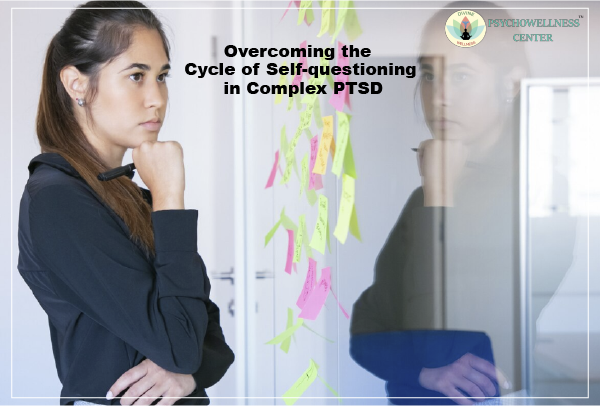Complex Post-Traumatic Stress Disorder (C-PTSD) is an often misunderstood psychological condition that arises from prolonged and repeated exposure to traumatic events, typically involving interpersonal abuse or neglect. Unlike standard PTSD, which is usually linked to a single traumatic event, C-PTSD manifests from sustained trauma, such as childhood abuse, domestic violence, or captivity, and brings with it a wide range of symptoms, one of the most paralysing being chronic self-questioning.
This internal cycle of doubt can be deeply corrosive, chipping away at an individual’s self-esteem, identity, and trust in their perception of reality. Breaking this cycle is essential to healing and reclaiming one’s sense of agency. Let’s explore how self-questioning takes root in C-PTSD and what strategies can help overcome it.
Understanding Self-questioning in Complex PTSD
Self-questioning in C-PTSD often stems from early experiences of emotional invalidation, gaslighting, and psychological manipulation. Survivors may have been consistently told that their feelings were wrong or exaggerated. Over time, they internalise this narrative, leading to a persistent inner voice that casts doubt on their thoughts, choices, and even memories.
This internal struggle might look like:
- “Was it really that bad?”
- “Maybe I’m just being too sensitive.”
- “I must have done something to deserve this.”
These thoughts are not merely fleeting doubts; they become a habitual form of cognitive self-sabotage. According to Herman (1992), a key feature of C-PTSD is a disrupted sense of self, where individuals no longer trust their perceptions, contributing to feelings of shame and helplessness.
The Impact of Self-questioning
The consequences of chronic self-doubt are profound. Anxiety, depression, anger, and social withdrawal are all possible emotional outcomes. Cognitively, it disrupts decision-making abilities and erodes confidence. Survivors may find themselves trapped in toxic relationships or situations, unable to assert boundaries or trust their instincts.
Moreover, self-questioning can become a barrier to recovery. It prevents individuals from seeking help, sharing their stories, or validating their pain. When someone is unsure whether they have the “right” to feel harmed, healing becomes a distant goal.
Strategies to Break the Cycle
Healing from the cycle of self-questioning in C-PTSD is neither linear nor swift. However, the following evidence-based strategies can significantly help individuals regain their trust in themselves.
- Name the Inner Critic:- One of the first stages in ending the pattern is recognising and labelling the inner critic. This critical inner voice often mimics the language or tone of past abusers or invalidating figures. Identifying this voice as separate from the self can help individuals begin to challenge it. According to Firestone (2010), giving this critic a name or character, such as “the Doubter” or “the Judge,”—can reduce its power and make it easier to confront. Because it externalizes the voice of self-doubt, survivors are more equipped to assess its messages.
- Practice Reality Checking:- Reality checking is a therapeutic tool that helps counter distorted thinking. When self-doubt arises, asking reflective questions like, “What evidence do I have for this belief?” or “Should I tell a buddy this? can provide clarity.
- Cognitive Behavioural Therapy (CBT) techniques often employ such methods to reframe negative self-beliefs (Beck, 2011). Journaling is particularly effective here—writing down thoughts and then analysing them for accuracy can help rewire patterns of negative self-perception.
- Rebuild Trust Through Safe Relationships:- Healing from interpersonal trauma requires safe and affirming relationships. Survivors need environments where their feelings are acknowledged, validated, and respected. These relationships—whether with a therapist, a support group, or trusted friends—can act as corrective experiences that reprogram the nervous system. According to van der Kolk (2014), the body holds onto trauma until it is released through experiences that feel safe and empowering. Trusting others can gradually help survivors trust themselves again.
- Inner Child Work and Self-compassion:- Many with C-PTSD carry inner wounds from childhood. Inner child work involves reconnecting with that vulnerable part of the self and offering the validation and love that was missing. This can be done through meditation, visualisation, or therapeutic exercises. When survivors treat themselves with kindness rather than criticism, the cycle of self-questioning weakens. Saying affirmations like, “It’s okay to feel this way,” or “I did the best I could with what I had,” helps replace shame with understanding.
Seek Professional Help
While self-help strategies are valuable, professional therapy is often necessary for deep healing. Modalities such as Eye Movement Desensitisation and Reprocessing (EMDR), Family Systemic Therapy, and trauma-informed CBT are particularly effective in treating C-PTSD. A trained therapist can help identify patterns, challenge distorted beliefs, and provide a safe space for healing.
Conclusion
Overcoming the cycle of self-questioning in Complex PTSD is an act of reclamation. It means stepping out of the shadows of invalidation and learning to honour your voice, feelings, and truths.
If you’re struggling with these patterns, know that you are not alone, and your pain is valid. With time, support, and the right tools, you can learn to trust yourself again and live a life not dictated by past wounds but inspired by present resilience.
Contributed by Ms Tanu Sangwan, Counselling Psychologist.
References
- Beck, J. S. (2011). Cognitive Behavior Therapy: Basics and Beyond (2nd ed.). Guilford Press.
- Firestone, L. (2010). Conquer Your Critical Inner Voice: A Revolutionary Program to Counter Negative Thoughts and Live Free from Imagined Limitations. New Harbinger Publications.
- Herman, J. L. (1992). Trauma and Recovery: The Aftermath of Violence—from Domestic Abuse to Political Terror. Basic Books.
- Neff, K. D. (2003). Self-compassion: An alternative conceptualization of a healthy attitude toward oneself. Self and Identity, 2(2), 85–101. https://doi.org/10.1080/15298860309032
- van der Kolk, B. (2014). The Body Keeps the Score: Brain, Mind, and Body in the Healing of Trauma. Viking.

